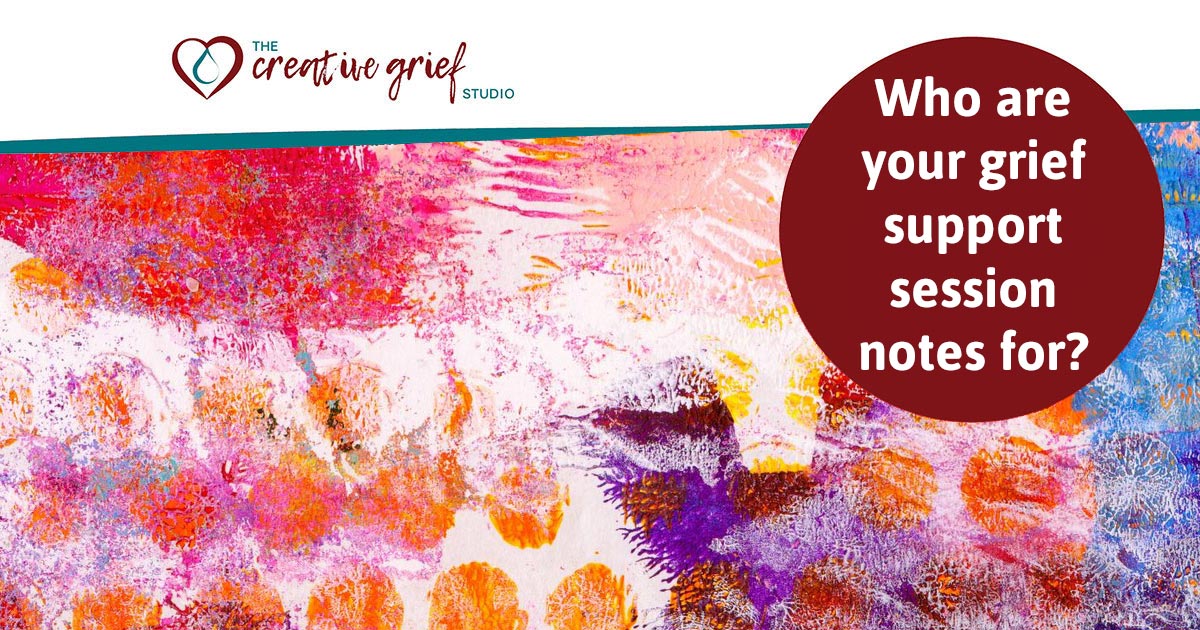Our students often ask for recommendations on the “best way” to take notes during or after grief support conversations. We love that the main concern that question seems to come out of is something along the lines of, “How do I be both a diligent note-keeper, and also be fully present in my conversations and relationship with my client?” There’s often concern expressed around management of eye contact. They wonder about how to write quickly or briefly, so as to not interrupt eye contact too much.
There are a lot of ways one can choose to write notes, and we really love that so many of our students are prioritising their relationship with their clients when they’re wondering about how best to write notes. We’d like to suggest that, before you consider the details of when and how you’ll write your grief support session notes, first ask yourself who you’re writing for or to.
Who do you expect will read your notes, and what do you hope they’ll get out of the reading?
Most of us have been trained and encouraged to write session notes for two people: ourselves, and our colleagues. Many of us wish to keep notes to be able to prompt our own memories of small but important details like the names of the deceased loved ones who are discussed in the sessions (and yet whom you’ve never met!). Many of us also like to keep notes to remind us of the kind of conversational and reflective territory and themes we’ve explored together. Perhaps we might also like to record some of our own wonderings and reflections at the end of each session, as reminders of potential areas for further exploration.
In some settings, you might be required to decide and record specific diagnoses and treatment plans. These, and other documents like referral letters, may need to be shared with colleagues or supervisors. Do you find yourself writing any differently when you are writing notes that you know will be read by your supervisor or colleagues? Do you notice if your self-talk says anything different when you’re attempting to write for your supervisor or colleagues? Are these writings perhaps more formal? Do you use more “professional” jargon?
What do you hope your supervisor and colleagues would get out of reading these writings? Do you ever feel the need to try to present yourself especially well when you know that your supervisor or colleagues will read your writing? Do you feel under pressure, perhaps in a bit of a toxic work environment, and perhaps sometimes your note-taking feels mostly like an exercise in “covering your ass”?
Have you ever had a client request to read your session notes, treatment plan, or referral letters?
I (Cath Duncan) remember when I first shifted my thinking around how I was writing when I recorded client interactions. I was in my first year post Social Work qualification. One of my new clients – a 13 year old young woman in foster care – asked to read her past files, in order to understand why she and her siblings were all taken into care. I agreed to read her files together with her, as a therapeutic process. As we read through all the notes and plans and reports that previous social workers had written about her and her family, it dawned on me how alienating, judgmental, disrespectful, and painful our “professional” ways of writing about our clients can be!
Have you considered what it would be like for your clients to read the notes that you write for yourself and your colleagues? Has a client ever given you feedback on that? Or maybe you’ve been a client yourself who’s requested copies of your referral letters and session notes from a helping professional of some sort… what was that like?
It’s still pretty uncommon for clients to request copies of their session notes and referral letters, but what if you always wrote your notes first and foremost FOR your client? Or TO your client. With the full intention of giving it to them to read and respond to?
A little exercise…
- Select a referral letter or a page of notes that you’ve written in the past. One that you wrote without any expectation that your client would read it. Read it not, trying to take on your client’s perspective. As your client, what was it like to read that document?
- Now re-write the document, taking account of your insight into your client’s experience of reading the old document. Re-write it, with the expectation that your client will receive a copy to read, and with the goal of producing a document that feels like it would be truthful, respectful, and hopeful if your client read it.
- Did you write the second document to other professionals or did you write it to your client? If you didn’t write it to your client, re-write the document again. This time, imagine that the document is primarily for your client (and perhaps some of your peers or your supervisor will receive a copy of it). Write in first person, in full sentences, directly to your client. How did your language and tone change? What do you think it would be like for your client to read this document now? How is this different from the first document? What difference would this document make for your relationship with your client?
- How do you feel about your peers or supervisor receiving your documents that you write primarily for and directly to your clients? How do you expect they might react? What values and beliefs might be evident in this reaction?
Could writing session notes for and to your clients, rather than for and to your supervisor and colleagues, become another way of advocating for your clients?

